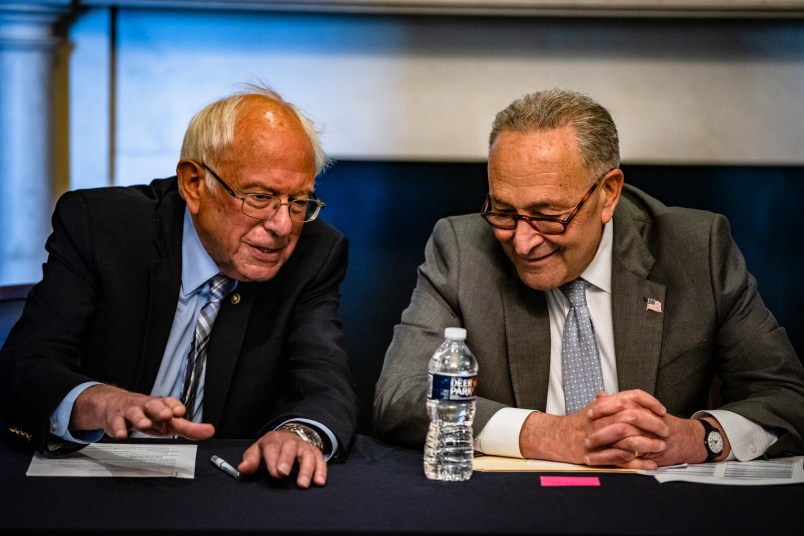The PRO Act will be included in the massive reconciliation bill currently under consideration by Senate Democrats.
At least, part of it will be. The question is, how much?
Sen. Bernie Sanders (I-VT) told reporters this month that the historic, $3.5 trillion, all-encompassing reconciliation package will include the PRO Act.
The House passed the PRO Act in March. In its entirety, the law aims at becoming the biggest expansion in protections for organized labor in more than a generation.
The bill would make a number of sweeping changes to American labor law, including giving independent contractors the ability to unionize, granting the National Labor Relations Board the ability to impose civil monetary penalties, and giving individuals standing to sue to enforce their own labor rights, among other things.
But the proposal, like much else in the reconciliation package, faces two hurdles: Garnering the votes of 50 Senate Democrats, and the Senate parliamentarian.
That, policy analysts told TPM, has whittled down the scope of the elements of the law likely to be included in the Senate’s version of the reconciliation bill, though they emphasize that advocates of the bill do not consider the reconciliation bill the end of the line, and remain committed to passing the full PRO Act.
“This legislation is absolutely critical in its entirety,” said Liz Shuler, a secretary-treasurer for the AFL-CIO, last week.
But any larger effort at passing the full PRO Act will likely wait until after reconciliation, Jobs with Justice Director of National Policy Adam Shah told TPM.
“We understand that the Senate has various arcane rules to thwart the will of the majority,” Shah said. “It’s rigged against working people, but nevertheless, there are parts of the PRO Act that would probably pass muster with the parliamentarian.”
Getting to 50
So far, two Democratic senators have yet to sign on to the bill: Sens. Mark Warner (D-VA) and Kyrsten Sinema (D-AZ).
The two remain holdouts on supporting the legislation, after labor groups secured support from Sens. Joe Manchin (D-WV) and Angus King (I-ME), and after Sen. Mark Kelly (D-AZ) signaled on Wednesday that he supported passing portions of the bill at least through reconciliation.
Sen. Warner has suggested that provisions in the law which aim at giving independent contractors — the type of worker used by Uber and Lyft, for example — the right to unionize are outdated.
“My fear is that parts of the PRO Act tries to fit all work into kind of a 20th-century classic W-2 employment status,” Warner said in May. “I think there ought to be a way we can provide benefits, provide flexibility.”
“I still think there is a role for labor organizations to help manage these benefits particularly for someone who has a variety of revenue sources coming in that meets workers where they’re at in 2021, doesn’t think we’re going to return to a 1980s-style economy,” he added at the time.
Shah, the Jobs with Justice official, added to TPM that provisions like the classification of independent contractors may get chopped away by the parliamentarian anyway. That could moot the question of Warner’s support — Kelly, for example, suggested on Wednesday that he was comfortable supporting the PRO Act via reconciliation in part because the independent contractor issue was unlikely to be included.
“Depending on how it’s done, I’m not necessarily opposed to that,” he told HuffPost.
Getting past the parliamentarian
If Democrats secure 50 votes for aspects of the PRO Act, they will next have to contend with a potential buzzsaw in the form of the Senate parliamentarian, who rules on what provisions are acceptable under budget reconciliation.
Democrats plan on including a proposal to allow the NLRB to issue civil monetary penalties in the bill, Bloomberg Law reported this week. The reconciliation bill could also include a range of tax changes meant to spur unionization, including the addition of a tax credit for union dues.
Other key provisions of the law, like a proposal to force employers that drag out bargaining negotiations to enter into mandatory arbitration before a new election can be called, would be unlikely to make it through budget reconciliation.
Absent a reduction in the power of the filibuster or a willingness to challenge the parliamentarian, Democrats will be limited in how much of the banner labor bill they can get through, Shah said.
“The process is all about trying to lower or limit the size of the deficit, decreasing the amount government spends,” he added. “The system is already rigged against working people, and if people aren’t willing to take the steps to fix it, then it will stay that way.”



